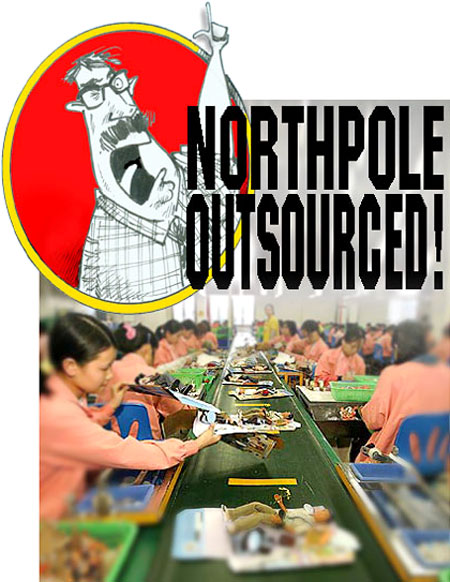Outsourcing Revisited
My favorite illustrator, John Cox, came up with this illustration last year that echoes, I think, public sentiment, especially during these trying economic times. Many believe we are abandoning our nation’s manufacturing roots in favor of becoming a country that makes nothing and buys everything from abroad but likes to think we’ll be dominant in the development of technology (with any related manufacturing, of course, being outsourced offshore.) Whew! Long sentence!

I think we’re deluding ourselves. We could regain our dominance in manufacturing if we simply uncoupled ourselves from labor unions. Why can’t we compete in auto manufacturing, even against Japanese auto makers who manufacture cars right here in the U.S.A.? Because the Japanese car makers are exempt from our trade unions (and aren’t financially hamstrung trying to support a bottom heavy legacy pension plan, but that’s another issue for another day). Hardly a level playing field, is it. But what are we doing about it? Nothing.
Anyway, I thought John’s illustration was particularly poignant at this time of year when we’re concerned about our economy and vanishing manufacturing roots. Fisher-Price, Mattel - many of this country’s major toy manufacturers - have outsourced the manufacturing of their toys to China, and quality and safety have suffered. Not too many years ago, Americans wouldn’t have accepted poor quality. But we’ve become a nation of “sheeple,” too fat and lazy to do anything about it. I hope we rediscover our cajones before it’s too late.
References (1)
-
 Source: North Pole Ootsourced
Source: North Pole Ootsourced




Reader Comments (15)
Your post raises some important questions. Why do we have tax incentives for those who offshore? Couldn't American companies achieve the same level of cost reduction if we did a better job of implementing lean manufacturing in U.S. facilities and save jobs at the same time? Doesn't offshoring put intellectual property at risk? Are we offshoring our innovation with respect to manufacturing methods? Is offshoring a quick fix for American companies that allows them to avoid dealing with more difficult changes necessary to achieve competitive advantage in a global economy? Are we capturing all of the costs associated with off shoring?
I don't have the answers, nor does anyone else if the number of books tackling the subject is any indication. What we need now is hard data, systematically gathered and without bias, to better understand the future effect of current practice and current policy on the U.S. economy and its job markets. Unfortunately, with so many vested interests involved in the debate, a study without bias will be difficult to achieve.
"Outsourcing America: What's Behind Our National Crisis and How We Can Reclaim American Jobs" is a well written book on the subject of outsourcing by Ron and Anil Hira. It discusses every issue from different angles.
Outsourcing is an emotionally-charged, politicized, and contentious issue. There seems to a clear lack of debate and those directly involved (from all sides) are selectively framing the issue.
Corporations and some economists argue that change is inevitable and outsourcing can be managed so that job losses are short-term. The book's authors challenge this argument by pointing out that these losses are not temporary and how outsourcing partly leads to the loss of technological innovation and competitiveness in the United States. Politicians have downplayed the negative aspects of outsourcing and experts advising them have provided biased information on the extent of outsourcing and its effects. Even the fourth sector, the media, has gone along with the arguments of those supporting outsourcing.
The authors suggest that those most directly impacted by outsourcing, American workers and citizens, have been the least represented in the debate. They do not ask that outsourcing be eliminated, but managed with particular care to help workers and communities disproportionately impacted from the effects of outsourcing.
America is in denial over this issue. We need to jumpstart an important debate crucial to America's future. The transition to a service sector economy with the loss of manufacturing jobs was painful, but the speed by which job losses in some service sector industries is occurring requires research and debate.
The myths and propaganda on outsourcing are enough to make your head spin. One thing is for sure: there will be long term economic implications if outsourcing and the use of guest worker visas are not soon addressed by experts in government with no ax to grind. I have done research on the subject and have concluded that the practice is destructive in the long run to America.
"addressed by experts in government with no ax to grind"?
As Sara points out, unbiased experts (especially in government) will be difficult (if not impossible) to find.
Every American should read "The Wealth of Nations" (1776, Book IV, Chapter II, pp.420-440, Modern Library edition). "First, every individual endeavors to employ his capital as near home as he can, and consequently as much as he can in the support of domestic industry; provided always that he can thereby obtain the ordinary, or not a great deal less than the ordinary profits of stock." (Smith, p.421; see also p.422-423) Assume that the returns are far less than ordinary. The individual should relocate his business in the foreign country so that he can sell the output he produces to his FOREIGN CUSTOMERS. Importation of these goods back into the home market for sale violates the theory of comparative advantage, since the relocated firm now has absolute advantage. For instance, Toyota and Volkswagen build plants in America to supply Americans with cars. They do not send their products back to Japan and Germany for sale in their home market, a la WalMart. Second, a retaliatory tariff is "...good policy...when there is a probability that they will procure the repeal of the high duties or prohibitions..." imposed by another country. Only when "there is no probability that any such repeal can be procured..." would a retaliatory tariff be a" bad method" (Smith,p.435). Third, "...freedom of trade (free importation of foreign goods) should be restored only by slow gradations, and with a good deal of reserve and circumspection" (p.435). Fourth, "To expect...that the freedom of trade should ever be entirely restored... is as absurd as to expect that an ...Utopia should ever be established..." because "...the private interests of many individuals irresistibly oppose it". Fifth, Smith fully supports revenue tariffs to fund government (Smith,p.439;see pp.845-850 for some of the negative consequences. Smith imposed such duties when he became a Customs official. The economic policies of George Washington and Alexander Hamilton were built on Tariffs) operations such as providing universal general and religious education(Smith,pp.767-768).
Some economists today present a list of the negatives resulting from the rush to implement a "globalization" policy that has not been done in slow gradations with a great deal of circumspection and reserve. Smith, a moral and ethical conservative, would be appalled to discover economists claiming that globalization is based on the theory of comparative advantage or that such a theory has anything to do with The Wealth of Nations.
I feel bad there are so many Americans out of work. Some people say that outsourcing is the wave of the future and that displaced workers should adapt to it by learning new skills. That is completely wrong! The whole idea of taking what we have and do and giving it to another country to do is self destructive and un-American. We need to take back our manufacturing and technology, rein in our unions so we can be competitive and save our nation!
It doesn't take an economist to see what is plain as the noses on our faces. We are committing economic and national suicide. All the highbrow economic mumbo jumbo in the world doesn't change that, it only serves to confuse everybody. We need to take back our industrial strength and protect our technology.
I agree. Why we allow these pop economists to experiment with what was a sound model is my question. It's "new math" all over again only on an even more disastrous scale.
That book was written in 1776? It's 2008 people! Times change! Get on board!
It sounds like you are for protectionism which requires isolation from the world economy. The better approach would be a gradual and well controlled entry into offshoreing vs no offshoring at all.
I think that is exactly what I said, Kevin.
Way over my head. I will leave it to those who have studied it more than I have.
I agree that it is too complex a subject for non-economists. I agree though that each time experiment with ideas different to the founders, we screw things up. I think I am with John on this.
Werwolf, you think something written in 1776 couldn't be as relevant today as it was then? You must be one of those who think the Constitution is a "living" document, to be tweaked as special interests want. Study world history man.
I am with Edmond, this is too complex a discussion for ma. I just know that all the out sourcing has cost us jobs and hurt our position as a great manufacturing country. The theory that it would be good for us hasn't worked. It is good for China and countries who we now buy everything from, but we headed on being dependent on other countries for not only our oil but most of our commodities. Being dependent on other countries for our existence is not a good place to be. No one can convince me otherwise!